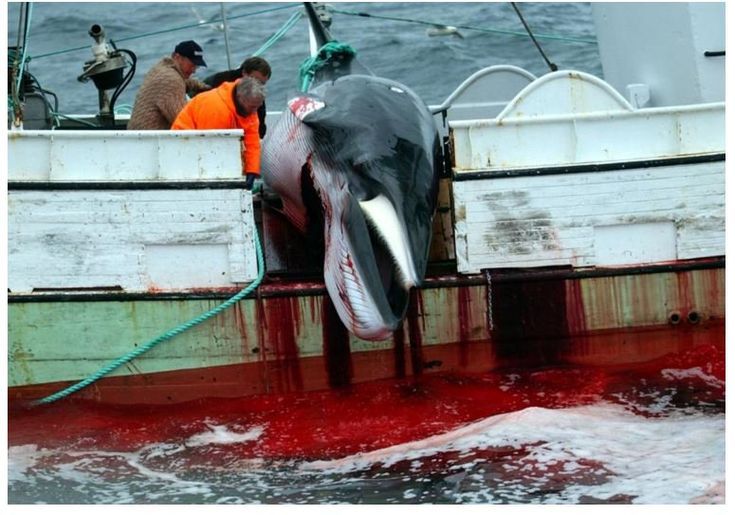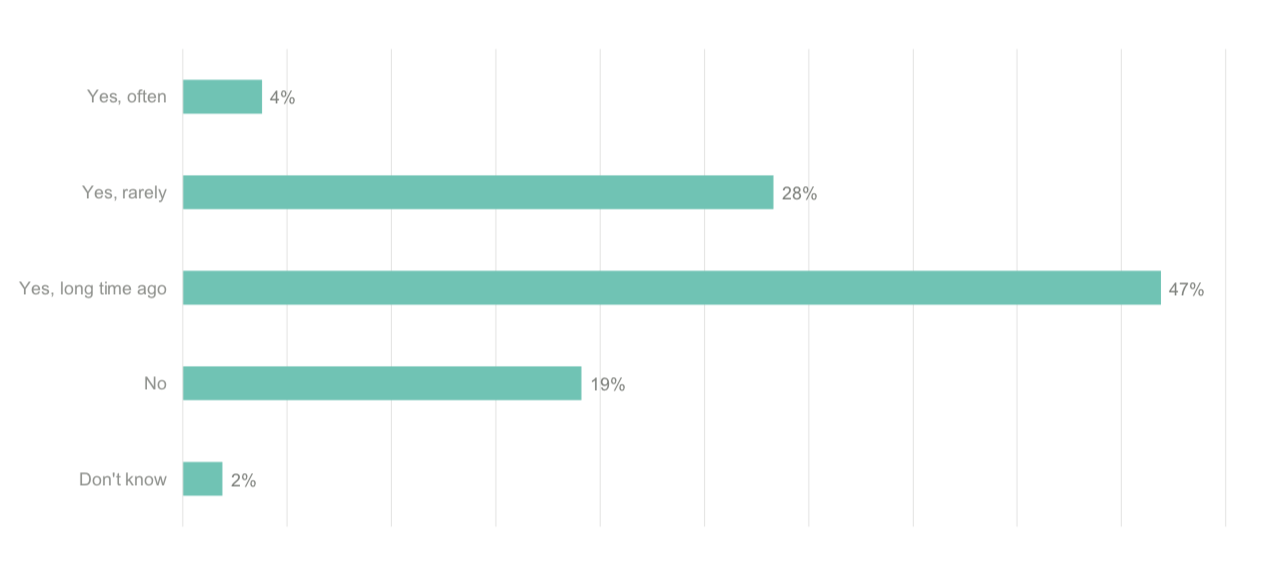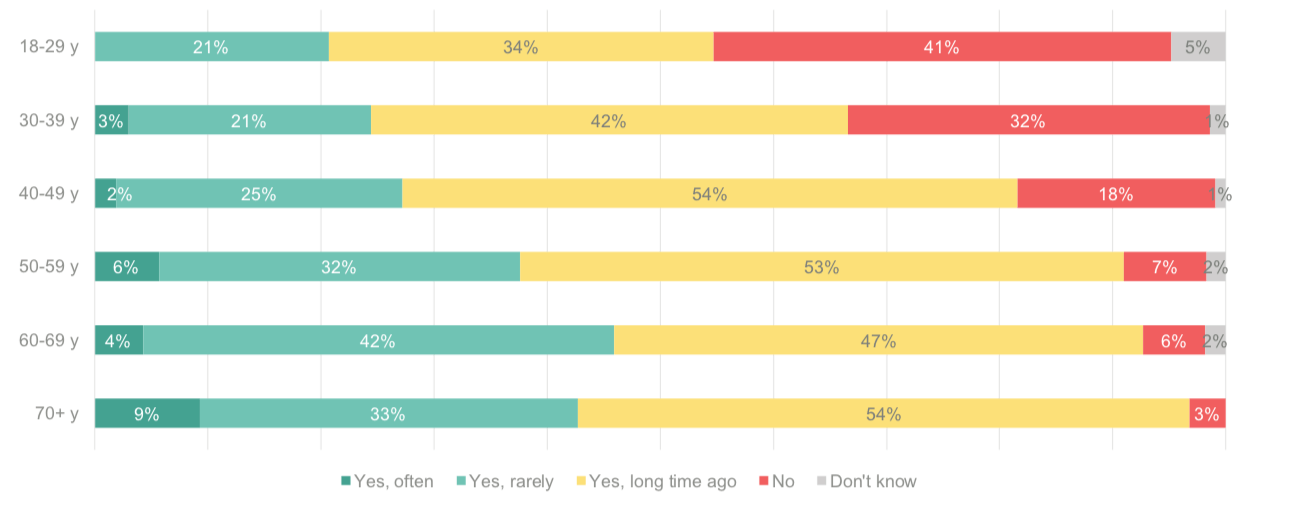Norway's Whaling Season Begins with a Quota of 1,300 Minke whales to be Slaughtered!
The 1st of April 2020 is a sad day for conservationists around the world as Norway begins its 2020 commercial whale hunting season. Despite a decreasing demand for whale meat and a global out-cry to protect the world's marine biodiversity, Norway once again defies the International Whaling Commissions (IWC) 1986 ban on hunting whales.
Minke whale killed in Norway. Source: Pintrest.
Norway is one of the wealthiest countries in the world, with their money generated from oil and gas exploits, and commercial fishing, the nation was named the world's richest country by the World Bank in 2018. For a country so liberal and politically correct in many other ways, how does Norway justify such a barbaric act in this day and age?
Norway's reasoning claims it is their right to use their natural resources and that they base their quotas on scientific knowledge and hunt whales in a sustainable way.
"Whales are healthy and are good food, and Norwegians want minke whales on the dinner plate" says Norway's Minister of Fisheries and Seafood, Harald T. Nesvik.
So lets take this opportunity to debunk the Minister's two-part statement released in the public press release.
1
. " Whales are healthy and good food"
: NOT TRUE
Whales are particularly vulnerable to environmental contaminants, including organochlorines—such as polychlorinated biphenyl (PCBs), dichlorodiphenyltrichloroethane (DDT) and dioxin—and heavy metals, such as methylmercury.
Each of these environmental contaminants tends to accumulate in the bodies of top predators, including sperm whales, orcas, pilot whales, and false killer whales. The most contaminated whale meat has come from those species that are fish or mammal eaters such as dolphins, porpoises, sperm whales, and beaked whales.
Baleen whales, such as minkes, feed lower on the food chain, and their tissues generally contain lower levels of contaminants. Nonetheless, tests of the blubber of minke whales from the north Atlantic have shown unsafe levels of pesticides and PCBs.
PCBs can cause nerve damage, reproductive and developmental disorders, immune system suppression, liver damage, skin irritation, and endocrine disruption. DDT exposure is associated with certain cancer risks and neurological and reproductive disorders. Dioxins can cause cancer, metabolic dysfunction, and immune system disorders. Methylmercury consumption can cause neurological and developmental problems. The contaminants are often highly concentrated in blubber because they are lipophilic, meaning they bond easily and even preferentially to fat.
One study of Faroe Islanders detected developmental disorders in children whose mothers consumed pilot whale meat and blubber regularly during pregnancy. In addition, some Inuit communities in the Canadian and Alaskan Arctic—where mothers regularly consume beluga whale meat and blubber (as well as meat from bowhead whales, seals, and polar bears)—have detected health problems in children who were exposed to contaminants in utero and through breast milk.
Whales no longer live in a pristine environment; we have polluted their habitat with poisons that concentrate in their tissues. Regardless of the amount, the consumption of whale meat can expose humans to dangerous contaminants.A study in 2003, examined blubber from 155 minke whales sampled in seven regions in the North Atlantic and European Arctic, including western and southeastern Greenland, the Norwegian Sea, the North Sea and the Barents Sea. Regional variation in Polychlorinated Biphenyls (PCBs) and organochlorine (OC) pesticide concentrations varied across the regions but indicated that these minke whales were highly mobile and feed in multiple areas across the Northeast Atlantic. This also debunks Norway's attitude that minke whales are THEIR resources alone.
2. " Norwegians want to see minke whales on their dinner plates ": NOT TRUE
A survey carried out in summer 2019 by the Animal Welfare Institute, Cetacean Society International, Humane Society International, NOAH: For Dyrs Rettigheter, OceanCare, Pro Wildlife, and WDC, Whale and Dolphin Conservation, showing that the facts are that the demand for whale meat in Norway is declining and less that 5% of Norwegians (mostly the elderly), regularly eat whale meat, despite massive government subsidies.
Q. Have you ever eaten whale meat?
According to the survey "Consumption of whale meat increase with age. Significantly more people under the age of 39 years have never eaten whale meat than those over 50 years old."
It also showed that the decline in whale meat and choices for not consuming whale meat included that interviewees "preferred other types of meat" and thought "it is wrong to kill whales".
Q. What are the reasons you would not like to consume whale meat in the future?
"Significantly more people in the age groups 18-39 and 60-69 will not eat whale meat because they believe that it is wrong to kill whales, than those in the age groups of 40-59 and 70+."
However, Norwegians weren't too concerned about their international reputation because of commercial whaling.
Q. Give your opinion on this statement "Whaling gives Norway a bad reputation."
"4 in 10 agrees, 1 in 4 disagrees with the statement. Significantly more men than women disagree with the statement."
Norwegian whaling quotas are issued despite of the International Whaling Commission (IWC) ban on commercial whaling. Since the implementation of the whaling ban in 1986 moratorium, Norwegian whalers have killed more than 14,440 minke whales. Norway's quota for 2020 is 1,278, the same number as 2019. In 2019, a whaling fleet of 12 vessels caught and killer 429 minke whales, which is a small decrease from 2018. O.R.C.Ireland plotted Norways catches since 2002 based on the official Norwegian governments press release and it appears that although minke whale quotas are on the increase in recent years, since 2014 their catches have been declining. Is this reflective of dwindling minke whale numbers? It certainly isn't reflective of less effort to catch and kill them, especially given the huge government subsidies gone into promoting the commercial hunting and consumption of minke whale meat.
Although Norway is fast becoming the top whaling country in the world, it receives little or no international attention or diplomatic pressure to end whaling. To support our work and to help end commercial whaling, we ask that our followers and supporters visit our online shop and make a one time purchase of an end whaling t-shirt, take a photo or selfie in the t-shirt and repost on Facebook, Twitter and Instagram with the #STOPWHALING and the country you wish to send your message to. E.G. #STOPWHALING #STOPWHALINGJAPAN #STOPWHALINGNORWAY #STOPWHALINGICELAND. We particularly ask residents of these countries to get behind our campaign to end commercial whale hunts.
Please SIGN THE PETITION!
Sign the Petition " Stop Whale Hunting In Norway ": HERE
References:
Hobbs, K.E., Muir, D.C., Born, E.W., Dietz, R., Haug, T., Metcalfe, T., Metcalfe, C., Oien, N., (2003). Levels and patterns of persistent organochlorines in minke whale ( Balaenoptera acutorostrata
) stocks from the North Atlantic and European Arctic. Environmental Pollution
;121(2):239-52.
www1
: Attitudes to Whaling; Norway 2019. A survey commissioned on behalf of: Animal Welfare Institute,
Cetacean Society International, Humane Society International,
NOAH: For Dyrs Rettigheter, OceanCare, Pro Wildlife, and WDC,
Whale and Dolphin Conservation.
www2
: Human Health Concerns of Whale Meat.
SHARE THIS ARTICLE




















